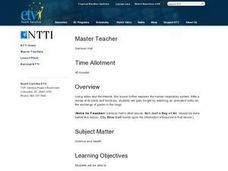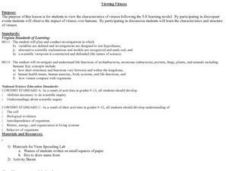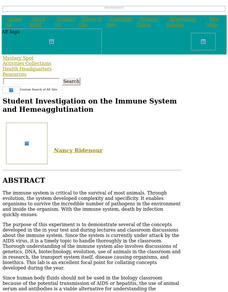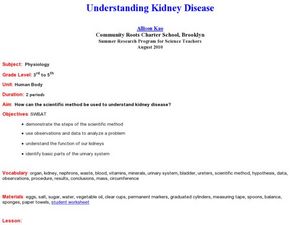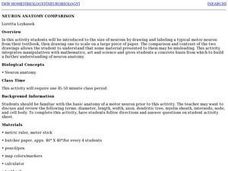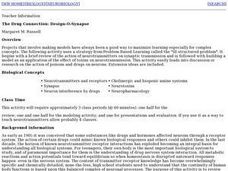Curated OER
CO2 Blow Out!
Fifth graders determine that carbon dioxide is a gas given off during respiration and that oxygent is the gas that is absorbed during respiration. They determine the air capacity of the lungs.
Curated OER
Dinosaur Tracks: From Stride To Leg Length To Speed
Students determine the relationship between leg length, stride length, and speed in humans and bipedal dinosaurs. They collect data and graph these human characteristics then use actual data collected from dinosaur track pads and fossils...
Curated OER
Viewing Viruses
Pupils view the characteristics of viruses following the 5-E learning model. By participating in discrepant events Students observe the impact of viruses over humans. By participating in discussion pupils examine the characteristics and...
Curated OER
Learning the Dissecting Planes
Students explore dissecting planes. In this biology lesson plan, students learn the basic vocabulary used in dissection, learn how to orient themselves on a three dimensional figure, and develop the manual dexterity necessary to use...
Curated OER
Making Blood!
Ninth graders study facts about human blood and what it is made of. In this blood composition lesson plan students divide into groups and complete several activities.
Curated OER
Student Investigation on the Immune System and Hemeagglutination
Students study laboratory protocol for hemagglutination experiments.
Curated OER
Hickory Dickory Dock: The Biological Clock
Students investigate the effect of day length on animal migrations. They view a Powerpoint presentation, identify their own personal migrations and cues, answer discussion questions, and test a hypothesis about seasons.
Curated OER
Testing the Waters
Eleventh graders examine a local body of water. In this science lesson, 11th graders collect water samples to test. Students analyze the data and make conclusions. Students create tables and graphs of the data.
Curated OER
Developing a Public Health Service Message
High schoolers communicate the biological basis for an aspect of a public health issue in a visual manner. They use the basics of a variety of diseases and epidemics to create their Public Health poster and service message.
Curated OER
What Is In The Water?
Learners investigate the biotic and abiotic factors that are found in an aquatic ecosystem. The emphasis is upon the investigation of present an projections of future water quality. Then students visit a local body of water to gather...
Curated OER
Zebra, Zebra Where Are Your Stripes?
Students observe the embryological development in the zebrafish. Developmental hierarchy from three germ layers is studied in depth. Research is validated on the body plan of the embryo.
Curated OER
Taxonomy Project
Students act as a taxonomist and, given a certain situation, classify existing organisms.
Curated OER
Hazard Mitigation: Bioterrorism
High schoolers discuss different ways to spread infectious diseases. In this bioterrorism lesson, students model the rate of smoke emission using CalRoad software. They analyze the effects of airborne release of...
Curated OER
Superhumans and Bionics: Building Hi-Tech Exoskeletons
Students explore how the body works. Students experiment and participate in activities to compare speed to stride length. Using the data collected, students draw conclusions about the biology of dinosaurs, their speed and stride length.
Curated OER
Studying Fossils: Dinosaur Tracks From Stride to leg Length to Speed
Students explore dinosaurs. Students determine the relationship between leg length, stride length, and speed in humans and bipedal dinosaurs. Students analyze collected information. Based upon the data, dinosaur tracks, and fossils,...
Curated OER
The Best Place in the United States to Live
Students, working in small groups, analyze information provided in U.S. maps to make a logical determination of the best place to live in the United States in regards to natural and human-made hazards. Then, working individually, they...
Curated OER
Understanding Kidney Disease
Young scholars experiment to determine information about kidney function. In this kidney function lesson, students use the scientific method to experiment with eggs, water, salt, sugar, and vegetable oil to simulate kidney function. They...
Curated OER
Neuron Anatomy Comparison
Students create a scale model of a motor neuron that is two hundred times larger than the actual neuron. They identify the structures of a neuron and observe neurons under the microscope then use a worksheet to convert actual sizes into...
Curated OER
The Drug Connection: Design-O-Synapse
Students study cholinergic neuromuscular pathway of acetylcholine release and develop a model for drug interaction at one specific neurological site. Working in teams, students can also research different drugs or poisons and produce a...
Curated OER
Making Connections: Exploring Our Brains through the Five Senses
Students record observations and create drawings and models of anatomy using their five senses. They describe the structures of a neuron and analyze each of their functions. They compare and contrast the typical structural features of a...
Curated OER
It's Challenging Being Green!
Students influence the plant life cycle as they take care of plants.In this caring for plants lesson plan, students understand the parts of the plant and their functions in keeping it alive. Students participate in experiments with...
Curated OER
Food For Thought
Young scholars examine their school population about their health and exercise patterns. They brainstorm a list of factors that influence people to eat the way they do.
Curated OER
Time Lapse Seed Germination with the QX3 Intel Digital Microscope
Students use the time-lapse feature of the QX3 Intel Digital Microscope
to observe germination of seeds. They use the QX3 Intel Digital microscope to create time lapse video films of seed germination experiments.
Curated OER
My Habitat Address
Sixth graders draw a habitat and write about what they would need to survive in the habitat. They define the input of items such as materials, energy, and information, and what goes out of the habitat. They play a "Habitat Address" game,...
